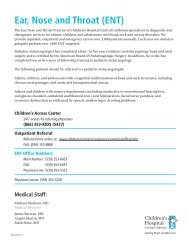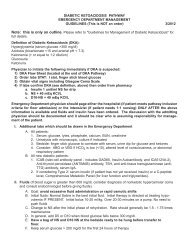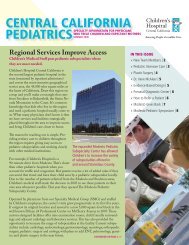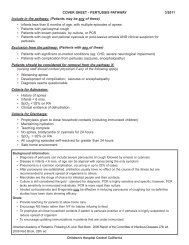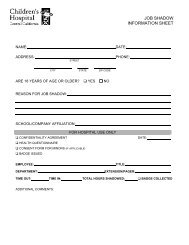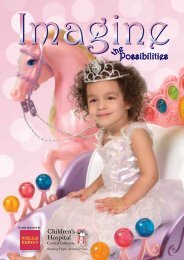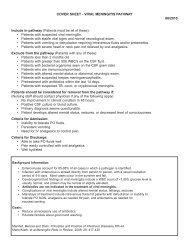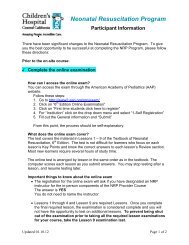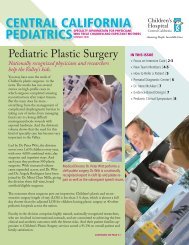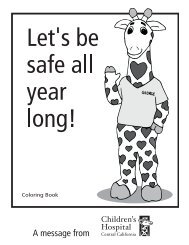Gastroenteritis Pathway - Children's Hospital Central California
Gastroenteritis Pathway - Children's Hospital Central California
Gastroenteritis Pathway - Children's Hospital Central California
Create successful ePaper yourself
Turn your PDF publications into a flip-book with our unique Google optimized e-Paper software.
<strong>Gastroenteritis</strong><br />
Education Information for Patients and Families<br />
What is the treatment What can I do at home<br />
• Antibiotics will not help viral gastroenteritis. Antibiotics may help with some forms of<br />
bacterial gastroenteritis, but these types are much less common.<br />
• Keeping the infant or child from getting dehydrated (not having enough liquids) is the<br />
main goal of home treatment<br />
• Don't make your child take liquids, formula or breast milk too fast if the child is vomiting<br />
every time you give your child food or liquids. Offer small sips about 10 or 15 minutes<br />
after your child last vomited.<br />
• Use Pedialyte until vomiting has stopped. Pedialyte is good because it helps put back the<br />
body's needed nutrients lost from vomiting. Pedialyte can be bought at your local grocery<br />
or drug store.<br />
• You should not offer large amounts of plain water. Water alone does not replace the<br />
necessary nutrients infants and children loose when there is vomiting and diarrhea.<br />
• If your child is no longer vomiting, try feeding your child some of the foods he/she<br />
normally eats. Offer these foods first, if he/she won't eat, give the Pedialyte solution or<br />
other liquids like formula, breast milk, etc. If your child was on milk before then start<br />
them back on milk.<br />
• Do not offer concentrated sweets such as sugar filled sodas, sports drinks, fruit juices, or<br />
Jell-O water with sugar. These can make diarrhea worse.<br />
• Choose sugar free drinks (diet 7 Up or diet Sprite).<br />
• Do not give medicines that slow the diarrhea. The diarrhea will stop when the bowel is<br />
getting better.<br />
• Feed your child foods low in fat and sugars. Fat is hard to digest.<br />
• Children with gastroenteritis can have foods such as rice, wheat, potatoes, breads, cereals,<br />
lean meats and chicken, fruits, and vegetables.<br />
• Lactose free formula (soy) may be needed for diarrhea that lasts longer than three days.<br />
• Infants and children older than 8 months of age who are given servings of low fat, active<br />
culture yogurt (check label on carton) may have fewer days of diarrhea. If your child does<br />
not like yogurt, acidophilus milk may also be helpful.<br />
• If your child has diarrhea, clean the diaper area as soon as your baby wets or stools. Use<br />
mild soap and water, wash from the front to the back. Expose skin over bottom to air<br />
frequently (leave the diaper off). Use A& D ointment or Desitin as needed.<br />
When should I call my doctor<br />
When your child has:<br />
• Dehydration (not taking enough liquids in) Watch for these things:<br />
o Dryness around the mouth<br />
o No tears when crying<br />
o Dry skin<br />
o Not as many wet diapers as usual or less urine than usual when they go to the<br />
bathroom<br />
o Sunken eyes<br />
Children’s <strong>Hospital</strong> <strong>Central</strong> <strong>California</strong> • 9300 Valley Children’s Place • Madera CA 93636 • (559) 353-3000<br />
Revised: 10/2008 Review by: 06/2011 Page 2 of 3



